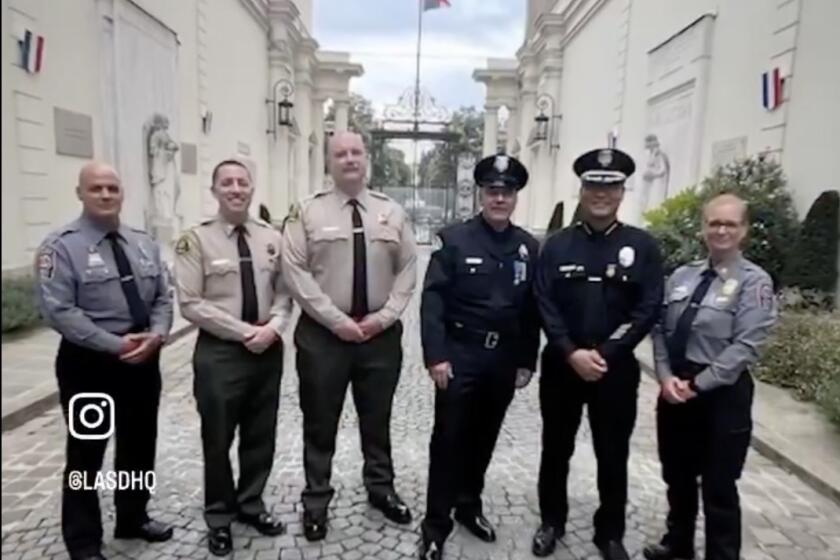Groups Push LAPD Reform Effort
A coalition of civil rights groups asked a federal judge Monday to extend the consent decree mandating reform of the Los Angeles Police Department, citing the city’s failure to substantially comply with that decree and arguing that the department’s own data show minority motorists are still more likely to be ordered out of their cars and frisked during traffic stops.
The U.S. Department of Justice joined the city in filing a separate report. In it, city and federal authorities agreed that the decree should be left in place beyond its scheduled expiration this year, but asked the judge to recognize the LAPD’s progress toward fulfilling many of its provisions and to limit the extension to those areas that remain unfinished.
The opposing positions will be heard May 15, when U.S. District Court Judge Gary A. Feess is scheduled to consider a possible two-year extension of the decree.
The decree was imposed five years ago as part of a settlement that headed off a lawsuit against the LAPD by federal prosecutors claiming the city had engaged in a pattern and practice of police brutality and civil rights abuses. Authorities were drawn to the LAPD by a series of incidents during the Rampart Division police scandal in which anti-gang officers were accused of improperly shooting and beating people and of planting false evidence.
The community intervenors in the court case, including the American Civil Liberties Union of Southern California, the Southern Christian Leadership Conference and the Asian Pacific American Legal Center, argued in papers filed with the court Monday that the court’s continuing supervision is needed to keep the LAPD from backsliding.
The intervenors opposed narrowing the decree.
“As this court has repeatedly recognized, the consent decree operates against a background of more than 40 years of promised reform that the city and the Los Angeles Police Department have failed to deliver,” said the intervenors’ filing, written by ACLU attorneys Mark D. Rosenbaum and Catherine E. Lhamon, and Duke University law professor Erwin Chemerinsky. “For the consent decree to be meaningful in the lives of people who live, work and travel in Los Angeles now, it and all its interlocking component paragraphs need to be in full effect before the consent decree can appropriately expire.”
LAPD officials say the city has substantially complied with 149 of the 191 consent decree mandates in 30 broad categories.
The city and federal prosecutors argued that the extended decree should no longer include provisions in 15 of the broad categories, including those involving training, integrity audits, community outreach, discipline, searches and arrests and performance evaluations.
The city filing said the extended decree should be limited to provisions in 16 categories, including processing of complaints, use of confidential informants, field training officers, operation of gang units and the creation of the TEAMS II computer tracking system.
“A streamlined extension of certain provisions of the consent decree is appropriate ... as it will allow the LAPD to focus its attention and resources on those areas where reforms have not yet been fully implemented and institutionalized,” said the joint filing by City Atty. Rocky Delgadillo and Wan J. Kim, assistant attorney general for the civil rights division of the Justice Department.
In addition to scaling back the scope of the extended decree, the city and federal attorneys requested that the inspector general for the Police Commission be allowed, after a year, to take over much of the role of Michael Cherkasky, a federal monitor appointed by the court to oversee compliance.
In response to the opposition filed by the ACLU and other groups, Deputy Mayor Maurice Suh said police reform is a top priority of the mayor and police chief. “I would encourage a less cynical view of the process we are in,” he said.
The joint filing by the city and federal government lends some support to that argument, as it features the Justice Department’s endorsement of the city’s progress. “Over the past five years,” the pleading states, “the defendants have made significant progress in implementing certain reforms of the consent decree.”
However, the filing also acknowledges that the city has not achieved substantial compliance with some aspects of the decree, including “significant substantive reforms” such as the development of the TEAMS II computer tracking system.
A key element of the consent decree, TEAMS II is supposed to provide data on each officer’s use of force, citizen complaints, lawsuits, traffic accidents and other issues that can help identify problem officers.
The written argument by the civil rights groups also took the LAPD to task for failing to complete TEAMS II, noting that its operation has an impact on other elements of the consent decree. Officers’ eligibility to be assigned to gang units or become field training officers requires the use of TEAMS II data, for instance.
The intervenors cited the Police Commission’s recent decision to withhold the names of officers involved in significant uses of force as further evidence that the department should not be trusted. That decision, the intervenors said, “signals a significant retrenchment” on the issue of public accountability.
“The city’s failure to offer any compelling explanation for noncompliance with consent decree provisions over the years is not confidence-inspiring for prospects for future reform absent external oversight,” the ACLU filing says.
The civil rights groups also challenged the city’s claim that it has acted on mandates to reduce discrimination in policing. The private attorneys noted the independent monitor has deemed data collected on traffic and pedestrian stops “very troubling.”
The first data released by the city on traffic stops found that African American and Latino motorists were more than three times more likely than white motorists to be asked to exit their vehicles and were about four times as likely to be patted down, the ACLU said.
Citing a city report on 2005 traffic stops, the ACLU said Latino motorists made up nearly 37% of the motorists stopped, but made up about 56% of the motorists who officers asked to exit their vehicles.
“Given the many racialized scandals that preceded and precipitated the consent decree, the lack of compliance with the nondiscrimination provisions in the consent decree are particularly egregious, distressing and telling to the community,” the court filing by the ACLU and other groups said.
More to Read
Sign up for Essential California
The most important California stories and recommendations in your inbox every morning.
You may occasionally receive promotional content from the Los Angeles Times.







